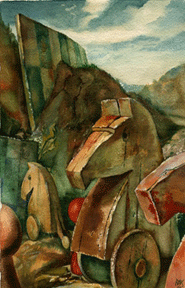
[â€Cease Fire†by Samuel Bek]
Wars are never won until they can be relegated safely to the history books. The recent Israel/Hizballah flare up is no exception. The spin masters are at work with both the main proponents claiming victory. Since Israel for the time being maintains 30,000 soldiers in southern Lebanon, continues to dominate the sky and has not yet ceased its sea blockade of Lebanon, the winner should be obvious. With the deployment of UNIFIL and Lebanese troops to replace the IDF, the goal of stopping Hizballah military muscle would seem to be on target. But Israel’s latest reaction is the kind that the term “Pyrrhic victory†(closely following the Bush administration’s ill-conceived invasion of Iraq) seems destined to define. The Katusha rockets will no longer thud aimlessly into northern Israel, but then there were hardly any being shot before Israel invaded.
There is an equally strong argument that Hizballah has come out of this with the smell of success, in terms of firing guns rather than roses. Not only have the main leaders and most of the fighters survived, but their prestige is soaring just about everywhere. Much of the Arab world is frustrated by the impotence of their countries to counter Israel’s military might; Nasrallah has become David and both sides are acting like proverbial Philistines. The hole in Goliath’s shock-and-awe armour is the hubris of an ideological narcissism that privileges being settlers over neighbors. It is not just that Israel has resorted to an “eye for an eye, tooth for a tooth†domestic and foreign policy, but the leaders constantly press for extracting more eyes and teeth than humanitarian ethics allow. It is not a matter of counseling Olmert to turn the other cheek, but he would better serve the future of Israel by not giving a blank check to hawks and considering sending out a dove (it worked for Noah) to look for common ground.
It is a lot easier to identify the losers. First, there are the dead on both sides, with over a thousand human lives seemingly expendable for an allegedly greater God-given and man-delivered “good†that certainly does no good to the victims. Then there are the larger number of wounded and maimed, who will carry the scars of being caught in the middle until they die. The emotional stress, harder to document but perhaps just as damaging to the human spirit, will linger on both sides. If you are Lebanese, you face an infrastructure destroyed beyond that of the earlier civil war. All kinds of bridges will need to be built to return to the normalcy that Beirut was so close to recapturing.
It could be argued that neither side can win for losing sight of the reasons the conflict has reached this stage. If anything, the latest lopsided round at least brings the wider issues back into focus, but at great cost to both sides. The greatest danger, and one that I fear will dominate the media pundits who massage public opinion, will be failing to get back to the root issue. Israel was established as a modern colony, justified in part by an ideological claim to have an eternal lease on the land of their patriarchs and kings. The so-called “squatters†on this land are still disenfranchized. Once infamously denied existence as “Palestinians,†their plight is the issue that must be resolved before peace has a glimmer of hope. Israel has a right to exist, but it also has a duty to coexist. The rhetorical cheerleaders against Zionism are just as much part of the problem. And those who bring God down from his silent perch to justify suicide bombings, holy war and hate in all its ugly forms should be drowned out by those of us who think that men should not play the role of God.
As a historian I do not think that the fifty years of conflict here prove that “Israelis†and “Arabs†or “Jews†and “Muslims†(and feel free to substitute the other markers available) are intractable enemies in some God-planned scenario that will end in an inferno for the rest of us and pedestals in paradise for killers. Atrocities have unfortunately been the norm in the history of our species, but we survive in large part because cooperation and pragmatism eventually win out unless those feuding literally die out. Neither the Israelis nor the Palestinians will disappear in the near future, unless a nuclear Armageddon becomes a damnable self-fulfilling prophecy. A hundred years from now historians (at least those Left Behind) will scratch their heads and ask, “Why did they take so long to get over it and get on with life?â€
Daniel Martin Varisco